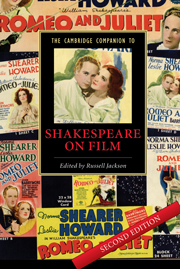Book contents
- Frontmatter
- Introduction: Shakespeare, films and the marketplace
- Part I Adaptation and its Contexts
- Part II Genres and Plays
- Part III Directors
- 9 The Shakespeare films of Laurence Olivier
- 10 Orson Welles and filmed Shakespeare
- 11 Grigori Kozintsev’s Hamlet and King Lear
- 12 Franco Zeffirelli and Shakespeare
- 13 Flamboyant realist: Kenneth Branagh
- Part IV Critical Issues
- Further Reading
- Filmography
- Index
- Series List
10 - Orson Welles and filmed Shakespeare
from Part III - Directors
Published online by Cambridge University Press: 28 July 2007
- Frontmatter
- Introduction: Shakespeare, films and the marketplace
- Part I Adaptation and its Contexts
- Part II Genres and Plays
- Part III Directors
- 9 The Shakespeare films of Laurence Olivier
- 10 Orson Welles and filmed Shakespeare
- 11 Grigori Kozintsev’s Hamlet and King Lear
- 12 Franco Zeffirelli and Shakespeare
- 13 Flamboyant realist: Kenneth Branagh
- Part IV Critical Issues
- Further Reading
- Filmography
- Index
- Series List
Summary
Like Coleridge’s Ancient Mariner, Orson Welles is an isolated figure, driven by his unrelenting passion: 'this heart within me burns'. After the precocious brilliance of Citizen Kane at the age of twenty-five, some critics have regarded his journey through the world as one of decline punctuated by failure. The compulsive nature of his vision has proved disconcerting and he has gathered an unseemly gaggle of detractors. The cinema industry with its priorities so firmly asserted by Hollywood’s premium upon financial success has tended to regard him as something of a wild and unpredictable grey-beard loon. Whilst there have been some critics who have sensitively praised Welles as the supreme auteur for his success in combining the roles of screenwriter, actor and director, they are possibly outnumbered by those who have an insatiable enthusiasm for fusing life and art. All too frequently the characters of Welles and Falstaff are yoked: 'In dramatising the simultaneous betrayal and self destruction of Falstaff, one can see Welles exploring a career of squandered talent and rejection.' Similarly, a jeering obsession with his weight was accompanied by accusations of sloth and contempt for his appearance in commercials. His self-exile from America may have been driven as much by pragmatism as pique, but the evidence that he was appreciated so much more in Europe, as 'a wise madman, a solitude surrounded by humanity', than at home, does contribute to the sense of his being a prophet without honour in his own land.
- Type
- Chapter
- Information
- The Cambridge Companion to Shakespeare on Film , pp. 187 - 202Publisher: Cambridge University PressPrint publication year: 2007
- 1
- Cited by

